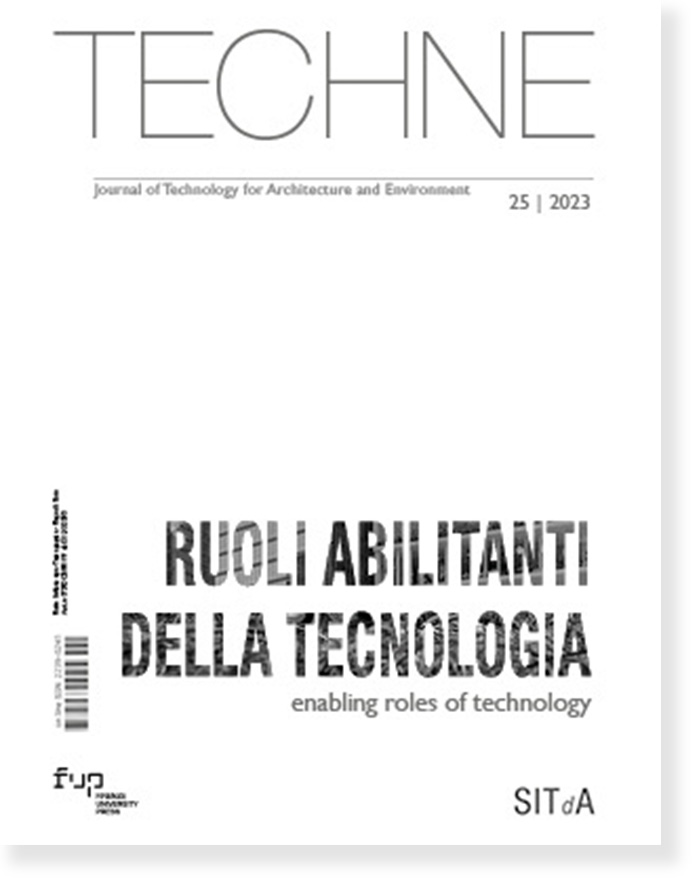Published 2023-05-30
Keywords
- Climate mitigation,
- Smart environment,
- Accessibility,
- Ecosystem services,
- Decentralised energy systems
How to Cite
Copyright (c) 2023 Ilaria Montella, Paola Marrone, Federico Fiume, Roberto D'Autilia

This work is licensed under a Creative Commons Attribution 4.0 International License.
Abstract
Cities are the main field of application of technological innovations for ecological transition and decarbonisation. With reference to its proximity spaces, the research proposes a multidisciplinary and transcalar vision in which analytical and quantitative methods of urban design are combined with qualitative assessment methods of technological design to simulate and measure the impacts of interventions in terms of mitigation and adaptation to the effects of climate change. A planning support tool, based on game theory, guides the choice between effective and interdependent solutions for decarbonisation through renewable energy production, ecosystem services and accessibility to essential services.
Downloads
References
Arbara. S, D’Autilia, R. (2021), “A Population Game Model for the Expansion of Airbnb in the City of Venice”, Sustainability, Vol. 13(7), 3829. Available at: https://doi.org/10.3390/su13073829 (Accessed on 22/08/2022).
C40 Knowledge Hub, A.o.U.a.o.t.J. (2020), How to build back better with a 15-minute city. Available at: https://www.c40knowledgehub.org/s/article/How-to-build-back-better-with-a-15-minute-city?language=en_US (Accessed on 22/08/2022).
D’Autilia, R., Spada, M. (2010) “Extension of Space Syntax Methods to Generic Urban Variables”, Urban Science 2018, Vol. 196(2), 82. Available at: https://doi.org/10.3390/urbansci2030082 (Accessed on 22/08/2022).
Droege, P. (2008), La città rinnovabile. Guida completa ad una rivoluzione urbana, Edizioni Ambiente.
Fremouw, M., Bagaini, A., De Pascali, P. (2020), “Energy potential mapping: Open data in support of urban transition planning”, Energies, vol. 13(5), pp. 1-15.
Geneletti, D., Cortinovis, C., Zardo, L., Blal Adem, E. (2020), Planning for Ecosystem Services in Cities, Springer Open, Cham, Switzerland.
Hirt, S., Zahm, D. (2014) The Urban Wisdom of Jane Jacobs, Routledge. Available at: https://doi.org/10.4324/9780203095171 (Accessed on 22/08/2022).
Izquierdo, L.R., Izquierdo, S.S., Sandholm, W.H. (2018), “EvoDyn-3s: A Mathematica computable document to analyze evolutionary dynamics in 3-strategy games”, SoftwareX, Vol. 7, pp. 226-233.
Liu, Z., Wang, S., Qi Lim, M., Kraft, M., Wang, X. (2021), “Game theory-based renewable multi-energy system design and subsidy strategy optimization”, Advances in Applied Energy, Vol. 2, 100024. Available at: https://doi.org/10.1016/j.adapen.2021.100024 (Accessed on 22/08/2022).
Lo Vullo, E., Muntean, M., Duerr, M., Kona, A., Bertoldi, P. (2020), GHG Emission Factors for Electricity Consumption, European Commission, Joint Research Centre. Available at: http://data.europa.eu/89h/919df040-0252-4e4e-ad82-c054896e1641 (Accessed on 22/08/2022).
Marrone, P., Montella, I. (2022), “An experimentation on the limits and potential of Renewable Energy Communities in the built city: buildings and proximity open spaces for energy decentralization”, Renewable and Sustainable Energy Transition, Vol. 2. Available at: https://www.sciencedirect.com/science/article/pii/S2667095X22000095 (Accessed on 22/08/2022).
Moreno, C., Allam, Z., Chabaud, D., Gall, C., Pratlong, F., “Introducing the 15-minute city: Sustainability resilience and place identity in future post-pandemic cities”, Smart Cities, Vol. 4(1), pp.93-111. Available at: https://doi.org/10.3390/smartcities4010006 (Accessed on 22/08/2022).
Sandholm, W.H. (2010), Population Games and Evolutionary Dynamics, The MIT Press, Cambridge, Massachusetts London, England.






